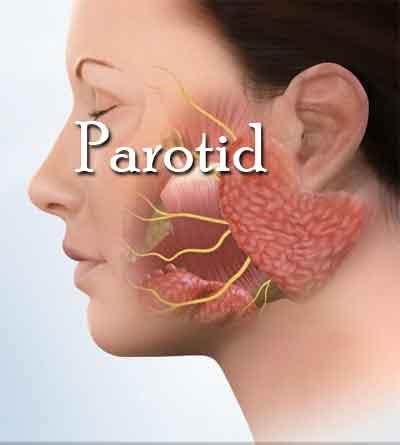- Home
- Editorial
- News
- Practice Guidelines
- Anesthesiology Guidelines
- Cancer Guidelines
- Cardiac Sciences Guidelines
- Critical Care Guidelines
- Dentistry Guidelines
- Dermatology Guidelines
- Diabetes and Endo Guidelines
- Diagnostics Guidelines
- ENT Guidelines
- Featured Practice Guidelines
- Gastroenterology Guidelines
- Geriatrics Guidelines
- Medicine Guidelines
- Nephrology Guidelines
- Neurosciences Guidelines
- Obs and Gynae Guidelines
- Ophthalmology Guidelines
- Orthopaedics Guidelines
- Paediatrics Guidelines
- Psychiatry Guidelines
- Pulmonology Guidelines
- Radiology Guidelines
- Surgery Guidelines
- Urology Guidelines
Parotid Neoplasms - Standard Treatment Guidelines

Ministry of Health and Family Welfare, Government of India has issued the Standard Treatment Guidelines for Parotid Neoplasms. Following are the major recommendations :
Name of the condition: Parotid neoplasm
When to suspect/ recognize?
- Introduction: Parotid gland is the commonest site of salivary gland neoplasms.
- Case definition: Neoplasms of parotid gland may be benign or malignant.
Incidence of the condition in our country: Not reported
Differential diagnosis: Skin, soft tissue and lymph node swellings form an important differential diagnosis of parotid neoplasm.
Prevention and counseling: Parotid lesions should be investigated and treated early to prevent morbidity of facial nerve injury and mortality due to advanced parotid malignancy.
Optimal diagnostic criteria, investigations, treatment and referral criteria
Situation 1 At Secondary Hospital/ Non-metro situation: Optimal standard of treatment in situations where resources are limited
Clinical diagnosis:
Painless, slow growing swelling in front of or below the ear. Occasionally, there may be a bulge in the tonsillar region if deep lobe is involved. Presence of pain or facial paralysis may suggest malignancy.
Investigations:
Fine Needle Aspiration Cytology is necessary to confirm the diagnosis and as a prelude to radical parotidectomy.
Treatment (Standard operating procedure)
Inpatient:
- Superficial parotidectomy is the treatment of choice for benign neoplasms located in the superficial lobe of parotid.
- Isolated deep parotidectomy or total parotidectomy with preservation of facial nerve is indicated for benign neoplasms located in the deep lobe of parotid.
- For malignant neoplasms of the parotid gland total parotidectomy with excision of adjacent involved structures, facial nerve and ipsilateral neck dissection, if required, should be done.
Outpatient: Not indicated
Day care: Not indicated
Referral criteria: Patient should be referred to a higher center if frozen section or nerve grafting of the facial nerve are anticipated.
Situation 2 At Superspecialty Facility in Metro location where higher end technology is available
Clinical diagnosis:
Painless, slow growing swelling in front of or below the ear. Occasionally, there may be a bulge in the tonsillar region if deep lobe is involved. Presence of pain or facial paralysis may suggest malignancy.
Investigations:
- Fine Needle Aspiration Cytology is necessary to confirm the diagnosis and as a prelude to radical parotidectomy.
- CECT/ MRI should be done to evaluate the nature of lesion, involvement of adjacent structures and presence of significant lymphadenopathy.
Treatment (Standard operating procedure)
Inpatient:
- Superficial parotidectomy is the treatment of choice for benign neoplasms located in the superficial lobe of parotid.
- Isolated deep parotidectomy or total parotidectomy with preservation of facial nerve is indicated for benign neoplasms located in the deep lobe of parotid.
- For malignant neoplasms of the parotid gland total parotidectomy with excision of adjacent involved structures, facial nerve and ipsilateral neck dissection, if required, should be done. iv. Ipsilateral neck dissection is indicated in the presence of significant lymphadenopathy. v. Frozen section biopsy is indicated if operative findings are suspicious of malignancy, even if it was not suspected preoperatively.
- Nerve grafting should be done when facial nerve needs excision.
Outpatient: Not indicated
Day care: Not indicated
Referral criteria: Not indicated
Who does what and timelines:
Doctor:
Clinical evaluation, treatment planning and execution.
Nurse:
Assisting in evaluation and treatment.
Technician:
Assisting in investigations and operation.
Guidelines by The Ministry of Health and Family Welfare :
Dr Sanjay Gupta Professor, Department of Surgery University College of Medical Sciences, Delhi

Disclaimer: This site is primarily intended for healthcare professionals. Any content/information on this website does not replace the advice of medical and/or health professionals and should not be construed as medical/diagnostic advice/endorsement or prescription. Use of this site is subject to our terms of use, privacy policy, advertisement policy. © 2020 Minerva Medical Treatment Pvt Ltd